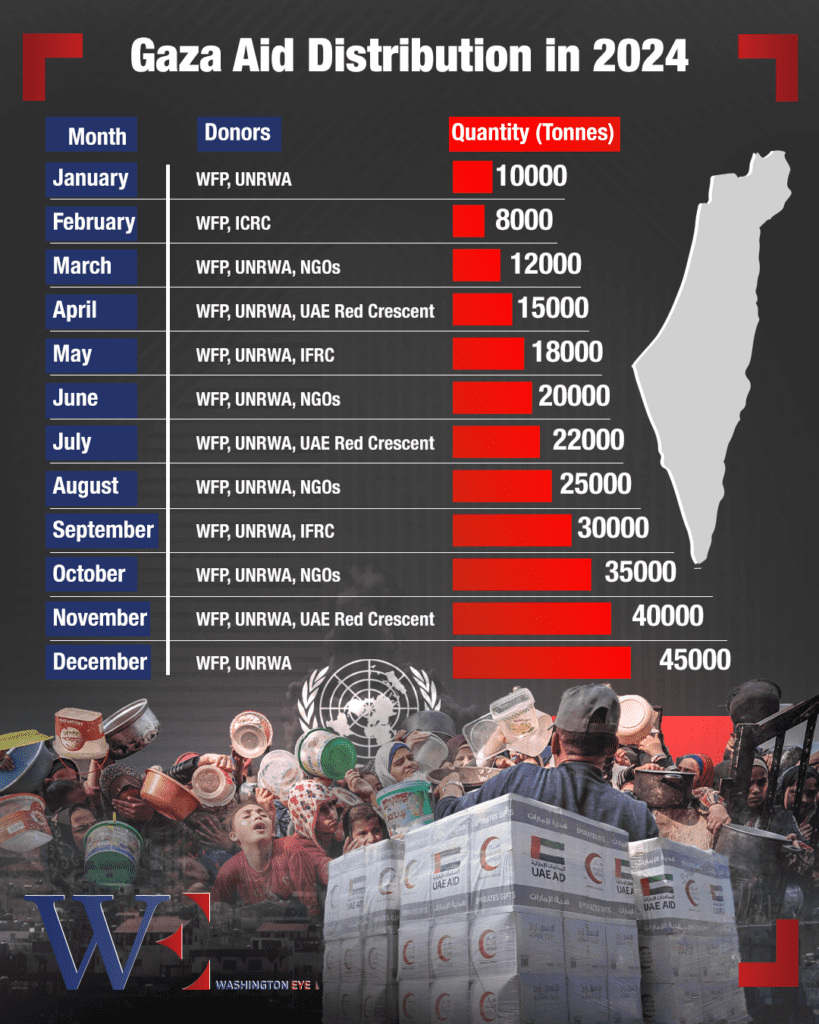The debate over the humanitarian crisis in Gaza has intensified following statements by US Ambassador to Israel, Jack Lew, who strongly challenged a recent famine warning issued by the Global Food Security Monitoring Initiative (GFSI). The GFSI, on December 24, 2024, warned that northern Gaza could face famine within weeks, highlighting an alarming level of food insecurity and a rapidly deteriorating humanitarian situation. However, Lew described the reports as “irresponsible” and criticized the exaggeration of the warnings, prompting the organization to review its findings.
The report issued by the GFSI warned that the ongoing blockade of Gaza and the disruption of food and aid supplies have created an increasingly dire situation, with food stocks running dangerously low. It predicted that the area could reach a full-scale famine, affecting hundreds of thousands of people, particularly in northern Gaza, where humanitarian access has been largely blocked by ongoing conflict. According to the report, the combination of food shortages, lack of access to essential resources, and the destruction of vital infrastructure could push the region to the brink of catastrophe.
In response, Ambassador Lew pushed back on the GFSI’s conclusions, calling the alarm over famine “overblown and premature.” He criticized the organization’s reliance on outdated population data and other inaccuracies in their assessment. “Such rhetoric is not helpful to the situation on the ground,” Lew remarked in a televised interview. He suggested that the reports might be adding to unnecessary panic rather than providing a clear understanding of the region’s challenges. Lew, a seasoned diplomat, emphasized that international agencies must work with the most accurate and up-to-date information to ensure that aid reaches those in need in an effective and coordinated manner.
The US response to the famine warning came as humanitarian organizations continue to face significant obstacles in providing relief to Gaza’s population. As the conflict persists, both sides of the debate on the famine warning have called for more precision and accountability when addressing the crisis.
While the ambassador’s remarks have caused a stir in diplomatic circles, humanitarian aid to Gaza has continued, with multiple countries and organizations stepping up to provide critical support. The United Arab Emirates (UAE), in particular, has been one of the key players in providing aid to Gaza in the face of escalating tensions. On December 22, 2024, three UAE convoys carrying 495 tonnes of humanitarian supplies reached Gaza. These convoys included vital provisions such as food, medical supplies, and hygiene products, which are desperately needed to sustain the population.
The UAE’s efforts, led by the country’s Ministry of Foreign Affairs and International Cooperation, are part of a broader strategy to provide immediate relief to Gaza, which has faced significant hardships due to the ongoing blockade and the impacts of the conflict. The UAE’s direct involvement in the aid efforts, including logistical support and coordination with international organizations, highlights its commitment to alleviating the suffering of those affected by the crisis.

The convoys delivered supplies to various locations across Gaza, ensuring that those most in need received assistance, including hospitals, displaced persons, and vulnerable communities. The UAE has maintained its position as a critical humanitarian partner in the region, and its continued support underscores the importance of multilateral aid in addressing complex crises such as the one currently unfolding in Gaza.
In addition to the UAE’s efforts, the international community remains divided over how best to assess and respond to the food security crisis. While some governments, including the United States, have expressed concerns over the potential consequences of exaggerating the famine threat, many other nations and humanitarian organizations have underscored the urgency of addressing the needs on the ground. The United Nations, in particular, has warned that any delays in delivering food and medical assistance could result in catastrophic consequences.
The humanitarian community is also grappling with the challenges of navigating a conflict zone where access to vulnerable populations is highly restricted. Many international organizations have highlighted the significant logistical hurdles posed by the blockade, which has made it increasingly difficult to deliver aid to the Gaza Strip. The destruction of infrastructure, such as roads, bridges, and warehouses, has further complicated efforts to distribute supplies efficiently.
The ongoing political and diplomatic tensions surrounding the Gaza famine warning reflect the broader challenges of conflict zone humanitarian work. While the US has taken issue with some of the claims made by organizations like the GFSI, its stance has not detracted from the urgency felt by humanitarian workers and those on the front lines. The debate also raises important questions about how the international community can more effectively address complex humanitarian needs, particularly when political considerations are intertwined with humanitarian assistance.
The pushback against the famine warning has sparked a broader discussion about the role of international agencies in conflict zones and the responsibility of governments to address the humanitarian impact of war. Critics of the US position argue that downplaying the severity of the crisis could undermine efforts to secure more comprehensive aid agreements and delay necessary interventions. These concerns have been echoed by other regional players, including countries like Egypt and Jordan, who have also called for a more aggressive response to the unfolding food crisis.
The UAE’s ongoing involvement in Gaza is seen as a direct counterbalance to the political and diplomatic tensions surrounding the conflict. The UAE’s continued commitment to providing aid, despite political challenges, reflects a broader regional effort to prioritize humanitarian relief over political differences. The convoys delivering aid are just one example of the UAE’s significant role in providing relief to those affected by the ongoing crisis in Gaza.
As the situation in Gaza remains fluid, the US and other international stakeholders are expected to continue their efforts to address the famine warning, with diplomatic discussions likely to intensify. The forthcoming review of the GFSI’s assessment will likely influence the direction of future aid and response strategies. The stakes are high, and the coming weeks will be critical in determining the effectiveness of the international community’s efforts to mitigate the potential for a full-scale famine in Gaza and to prevent further loss of life.
















